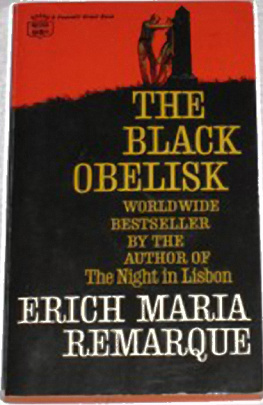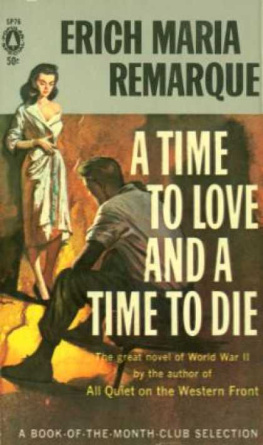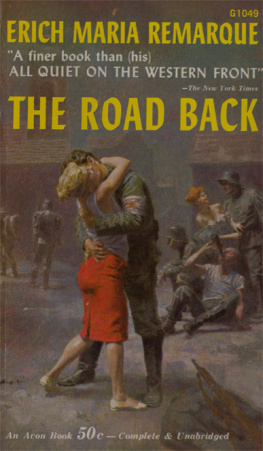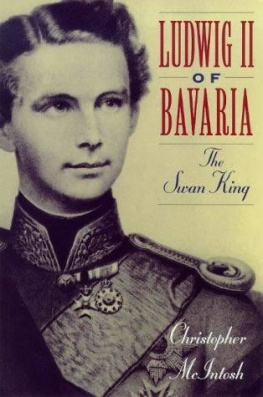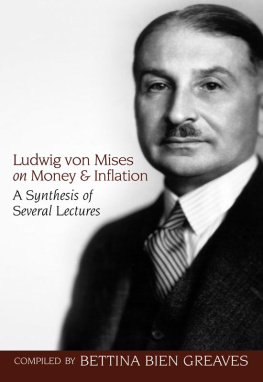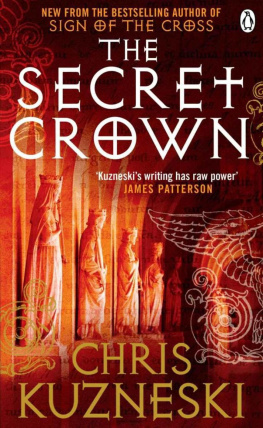1.
The sun is shining in the office of Heinrich Kroll and Sons, Funeral Monuments. It is April, 1923, and business is good. The first quarter has been lively; we have made brilliant sales and grown poor in the process, but what can we do? Death is ineluctable, and such is human sorrow that it demands memorials of sandstone, marble, or even, when the sense of guilt or the inheritance is large, of costly black Swedish granite polished on all sides. Autumn and spring are the best seasons for dealers in the appurtenances of griefmore people die then than in summer or winter: in autumn because the sap has dried up, and in spring because it mounts and consumes the weakened body like too large a wick in too thin a candle. That at least is the conviction of our most active agent, Liebermann, the gravedigger at the municipal cemetery. And he ought to know: he is eighty years old, has buried upward of ten thousand corpses, has bought a house on the river and a trout hatchery with his commissions on tombstones and, through his profession, has become an enlightened brandy drinker. The one thing he hates is the city crematorium. It is unfair competition. We do not like it either. There is no profit in urns.
I look at the clock. It is a little before twelve, and since today is Saturday I prepare to close up. I slam the metal cover over the typewriter, carry the Presto mimeograph machine behind the curtain, clear away the stone samples, and take the photographic prints of war memorials and artistic funeral monuments out of the fixing bath. I am the advertising manager, draftsman, and bookkeeper for the firm; in fact, for a year now I have been the sole office employee in what is, after all, not even my own profession.
With anticipation I take a cigar out of the drawer. It is a black Brazilian. The salesman for the Wurttemberg Metal Works gave it to me this morning with the intention of foisting off on me later a consignment of bronze wreaths; so it is a good cigar. I look for a match, but as usual they have been mislaid. Fortunately a small fire is burning in the Dutch oven. I roll up a ten-mark bill, hold it in the flame and light the cigar with it. At the end of April there is no longer any real need for a fire in the oven; it is just a selling aid devised by my employer Georg Kroll. He believes that in time of sorrow when people have to hand out money they do it more willingly in a warm room than when they are cold. Sorrow in itself is a chilling of the soul, and if you add cold feet, it is hard to extract a decent price. Warmth has a thawing effect even on the purse. Therefore our office is overheated, and our representatives have it dinned into them as an overriding principle never to attempt to close a sale in the cemetery when it is cold or rainy, but always in a warm room and, if possible, after a meal. Sorrow, cold, and hunger are bad business partners.
I throw the remnant of the ten-mark bill into the oven and stand up. At the same instant I hear a window thrown open in the house opposite. I don't need to look around to know what is going on. Cautiously I bend over the table as though I still had something to do to the typewriter. At the same time I peep into a little hand mirror which I have so arranged that I can observe the window. As usual it is Lisa, wife of Watzek, the horse butcher, standing there naked, yawning and stretching. She has just got up. The street is old and narrow; Lisa can see us and we can see her and she knows it; that is why she is standing there. Suddenly a quirk appears in her big mouth; she laughs, showing all her teeth, and points at the mirror. Her eagle eye has spied it I am annoyed at being caught but act as though I had not noticed and retreat to the back of the room in a cloud of smoke. After a while I return. Lisa grins. I glance out, but not at her; instead I pretend to wave at someone in the street. As an extra flourish I throw a kiss into the void. Lisa falls for it; she is as inquisitive as a goat. She bends forward to see who is there. No one is there. Now I grin. She gestures angrily at her forehead with one finger and disappears.
I don't really know why I carry on this comedy. Lisa is what is called a terrific figure of a woman, and I know a lot of people who would gladly pay a couple of million to enjoy such a spectacle every morning. I, too, enjoy it, but nevertheless it irritates me that this lazy toad, who never climbs out of bed until noon, is so shamelessly certain of her effect. It would never occur to her that there might be men who would not instantly want to sleep with her. Besides, the question does not even greatly interest her. She only stands at the window with her black pony tail and her impertinent nose and swings her first-class Carrara marble breasts like an aunt waving a rattle in front of a baby. If she had a couple of toy balloons she would happily wave them; it is all the same to her. Since she is naked, she waves her breasts; she is just completely happy to be alive and to know that all men must be crazy about her, and then she forgets the whole thing and goes to work on her breakfast with her voracious mouth. Meanwhile, Watzek, the horse butcher, is slaughtering tired old carriage nags.
Lisa appears again. Now she is wearing a false mustache and is beside herself at this witty inspiration. She gives a military salute, and I assume that she is so shameless as to have her eye on old Knopf, the retired sergeant major whose house is next door. But then I remember that Knopf's bedroom window opens on the court. And Lisa is artful enough to know that she cannot be observed from the few other neighboring houses.
Suddenly, as though a reservoir of sound has burst its dike, the bells of St. Mary's begin to ring. The church stands at the end of our alley, and the strokes resound as though they fell straight from heaven into our room. At the same time I see outside the other office window, the one that faces on the court, my employer's bald head gliding by like a ghostly melon. Lisa makes a rude gesture and shuts her window. The daily temptation of Saint Anthony has been withstood once more.
Georg Kroll is barely forty, but his head is already as shiny as the bowling alley at Boll's Garden Restaurant. It has been shiny as long as I have known him, and that is over five years. It is so shiny that when we were in the trenches, where we belonged to the same regiment, a special order was issued that even at the quietest times Georg had to wear his steel helmetsuch would have been the temptation, for even the kindliest of enemies, to find out by a shot whether or not his head was a giant billiard ball.
I pull myself together and report: "Company Headquarters, Kroll and Sons! Staff engaged in enemy observation. Suspicious troop movements in the Watzek sector."
"Aha," Georg says. "Lisa at her morning gymnastics. Get a move on, Lance Corporal Bodmer. Why don't you wear blinders in the morning like the drummer's horse in a cavalry band and thus protect your virtue? Don't you know what the three most precious things in life are?"
"How should I know that, Attorney General, when life itself is what I'm still searching for?"
"Virtue, simplicity, and youth," Georg announces. "Once lost, never to be regained! And what is more useless than experience, age, and barren intelligence?"
"Poverty, sickness, and loneliness," I reply, standing at ease.
"Those are just different names for experience, age, and misguided intelligence."
Georg takes the cigar out of my mouth. He examines it briefly and classifies it like a butterfly. "Booty from the metal-works."
He takes a beautifully clouded, golden-brown meerschaum cigar holder out of his pocket, fits the Brazilian into it and goes on smoking.
"I have nothing against your requisitioning the cigar," I say. "It is naked force, and that's all you noncoms know about life. But why the cigar holder? I'm not syphilitic."

